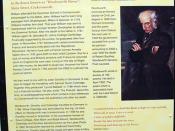My first impression of Tintern Abbey was unenthusiastic, marked by my own superficial reading. However, by perusing it more carefully, the thought, the meaning, and the apparent nebulousness into a strangely enlightening piece. The setting is at once unfamiliar to me, but dwelling on more distant memories, I, too, can connect with the thrusts and positions of the narrator, Wordsworth. Through a period of growth, a previously insensible and philistine view of nature is replaced with a more noble one in which the self relies on not the creator, but as I interpreted, the creation.
The description of the first paragraphs was powerful, the only tangible nature described, but containing a comprehensive immersion in an almost pastoral environment. Removed from his instinctive roots for so long, the persona returns to this natural place to "behold steep and lofty cliffs" (41). Although nature was powerful to Wordsworth, it also contained a pervading peace, which Wordsworth was so desperate for in his forever-altering world.
Peace was defined by solitude, of the wandering, but satisfied "vagrant dwellers in the houseless woods,/Or of some Hermit's cave,/where by his fire/The Hermit sits alone " (20-22) I also feel as if I can connect with nature, not for its primeval character, but the solitude it offers. The modern world, even more so than Wordsworth's, is congested and callously changing, so it is only when I return to the simplest of simple, my backyard or a walk in the wilderness of this local park I often visit, that I feel truly relieved.
Unlike previous authors we have read, the persona's "crutch", his vitality counted not on a God or creator, but the seemingly eternal and omnisciently tranquil nature. While I do not personally concur with Wordsworth's point entirely, I think it is a...


